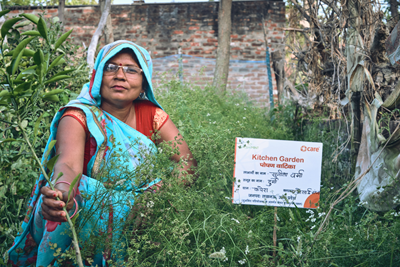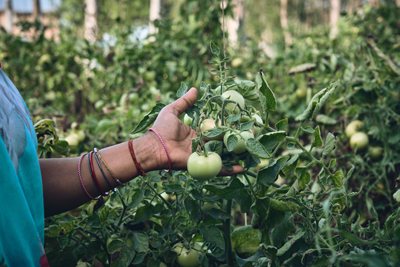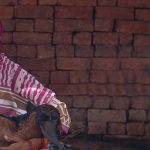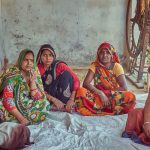WOMEN EMPOWERMENT
 In the village of Kapera Wadarpur in Gosaiganj cluster of Lucknow district in Uttar Pradesh resides Sunita Verma with her husband and two sons. Born and married into a farming household and given all the trials and tribulations she and her husband has worked hard over the years to educate their sons- one is studying B Pharma and the other (Diploma in Elementary Education- so that they can have a better life and not be totally dependent on the vagaries of agriculture.
In the village of Kapera Wadarpur in Gosaiganj cluster of Lucknow district in Uttar Pradesh resides Sunita Verma with her husband and two sons. Born and married into a farming household and given all the trials and tribulations she and her husband has worked hard over the years to educate their sons- one is studying B Pharma and the other (Diploma in Elementary Education- so that they can have a better life and not be totally dependent on the vagaries of agriculture.
“Over the last two years a lot has changed in our dietary intake after Mamta Didi from CARE India came and spoke to us. Prior to that we did not understand the importance of dietary diversity and how it can affect our health in the long run” shares Sunita.
Sunita and her husband have been farming potatoes, radish, onions and garlic. Intake of vegetables was intermittent as they were expensive to buy from the market and they were not always fresh.
Sunita adds “Mamta Didi introduced us to the concept of kitchen gardens, and trained us how to create one, maintain it and the different vegetables which must be grown for us to get wholesome nutrition. She guided us how to test the soil and improve the crop yield and also gave us seeds and shared tips as how we can do organic farming which will improve the taste of the produce and ensure our health”
 Today, Sunita practices crop rotation in her small kitchen garden where tomatoes and bananas are growing very well. In other seasons she will grow different vegetables. The excess produce is also sold in the market earning the family much-needed extra income to live and eat better as well as educate the children.
Today, Sunita practices crop rotation in her small kitchen garden where tomatoes and bananas are growing very well. In other seasons she will grow different vegetables. The excess produce is also sold in the market earning the family much-needed extra income to live and eat better as well as educate the children.
“Using organic fertiliser and insecticide in our kitchen garden has not only improved the output, but the vegetables are tastier and safer for our health. We are also certain of their freshness as they are from our own garden. Also, we are today aware as to which vegetables will provide us what essential minerals in our body for healthy balanced living” says Sunita.
Sunita is looking forward to expanding her kitchen garden and improving her productivity, so that more vegetables can be grown through the year, and she can earn even more from selling her excess produce in the local mandi for ready cash. She is very fond of organic farming, and for this, she has bought earthworms, and along with the technical support of the CARE team has started the work of manufacturing Vermicompost manure.
About the Programme: Mint farmers in India produce 80% of the world’s supply of mint and rely on the crop to provide household liquidity. In Uttar Pradesh, women mint farmers largely engaged in subsistence farming face a variety of socio-economic challenges, such as gender inequality, food insecurity, and financial illiteracy. In addition, these women mint farmers have also been affected significantly due to COVID-19. MARS has partnered with CARE India with the Shubh Mint project to support 4,755 women to overcome these challenges which improves their overall quality of life.
Posted by: Vandana Mishra, Program Manager
Location: Kapera Wadarpur, Gosaiganj block, Lucknow, Uttar Pradesh






